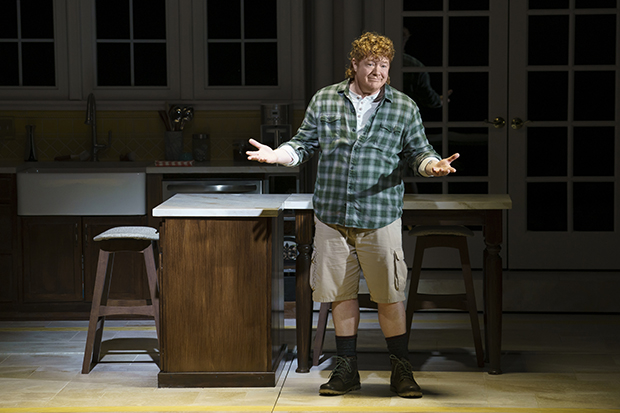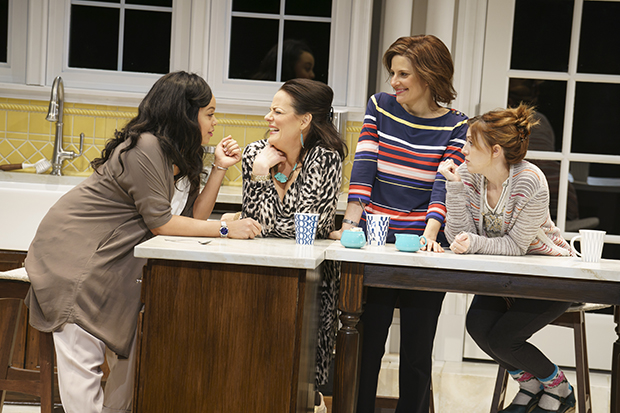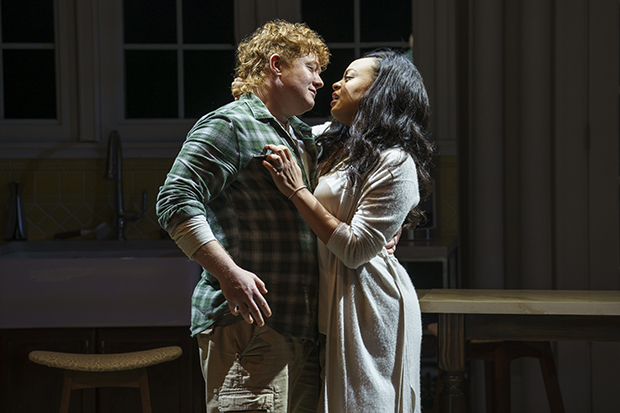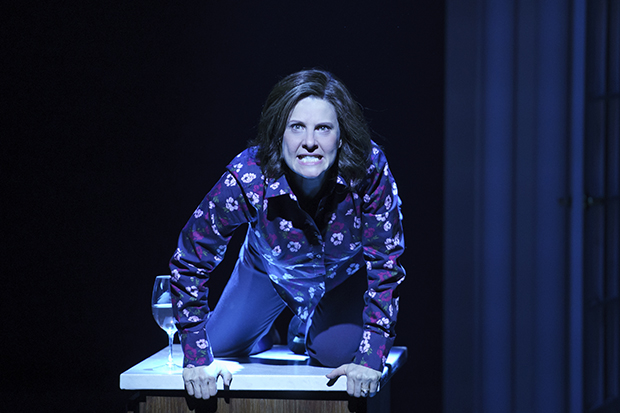A Green Goddess Seduces New Jersey Housewives in Hurricane Diane

(© Joan Marcus)
Dionysus never really left us. This great Greek god of unreason stuck with us through monotheism and mass media, even when all the other gods departed for the static confines of Mount Olympus. As told by the brilliantly imaginative Madeleine George, Dionysus is Diane, a woman who has been living happily among a lesbian collective in Vermont. But in light of serious ecological upheaval, she's traveled to New Jersey to save humanity from itself.
That's the starting point of Hurricane Diane, the uproarious queer riff on Euripides's The Bacchae, a play that was already pretty queer to begin with. It is now playing at New York Theatre Workshop in an attractive production by director Leigh Silverman.
Posing as a landscaper, Diane (Becca Blackwell) looks for new suppliants in Monmouth County. She starts with Carol (Mia Barron), a compliance officer for a pharmaceutical company who wants nothing more for her yard than a wrought-iron accent bench, the kind she's seen in the pages of HGTV Magazine. Her friend and neighbor, Renee (Michelle Beck), actually works for that magazine, but she's more interested in what Diane is offering: small-scale permaculture that rips out perfectly manicured lawns and replaces them with fruit-bearing trees.

(© Joan Marcus)
Proud Italian-American Pam (Danielle Skraastad) isn't so interested in pawpaws, but she would like Diane to create something resembling the palazzo garden featured in a mural at the local trattoria. Recently abandoned by her husband, Beth (Kate Wetherhead) just wants the kind of flowers that will attract fairies. But as another major storm threatens the New Jersey coast, we wonder if any of their gardens stand a chance.
In the 21st century, the deity of wine and theater is most often portrayed as a man in touch with his feminine side: a drag queen or glam rocker. George boldly envisions the inverse, a female god in touch with her butch side. I hesitate to describe Blackwell's surprisingly alluring performance as masculine. Rather, it is an enticing expansion of what femininity can be. Dressed in flannel and cargo shorts, and crowned with a mane of ginger hair, Blackwell's Diane seduces these New Jersey housewives with her pelvic vitality as surely as she seduces us.

(© Joan Marcus)
The other cast members make equally strong impressions under Silverman's agile direction: Beck is sexy and assertive as Renee, a successful careerist who not-so-secretly pines for her formative lesbian days. Wetherhead is simultaneously wispy and powerful as the aptly named Beth Wann. Skraastad gives a grand performance worthy of La Scala as Pam, a woman who can unleash a fierce volley of inspirational clichés as if they were arrows shot from the bastions of her suburban castle. She's exhausting.
But she's nothing compared with Barron's Carol, whose rigid politeness and frosty smile constitute the sturdiest fortification in the show. She empties packet after packet of Splenda into her coffee, and we get a sense that she's combating an allergy to all things natural and unsweetened. She is the Apollonian spokeswoman, the logical conclusion of a life powered entirely by science and white zinfandel.
Their lives take place on Rachel Hauck's set, which depicts a catalogue-ready suburban kitchen complete with an island. Since all of their houses have the exact same layout, Silverman is able to stage overlapping scenes of the women yelling at their husbands without any of us assuming they're actually in the same room (thrillingly, this is a Bacchae in which no men appear). Kaye Voyce individualizes the women with her costumes (I particularly enjoyed Pam's animal-print dresses and sparkly sneakers). Lighting designer Barbara Samuels and sound designer Bray Poor collaborate to bring the sights and sounds of a hurricane into the theater, causing us to jump out of our seats.

(© Joan Marcus)
A misstep of a final scene causes Hurricane Diane to die with a whimper and tepid applause when it could have easily gone out with a roar and a collective gasp by ending after the penultimate scene. Still, the majority of the play takes our breath away, either with its keen insight or gut-busting wit. Through the sharpest comedy, George stealthily lays out the tragedy of the American upper-middle class, a force more stubborn, proud, and powerful than any ancient god. Is it any wonder that they all disappeared when faced with such fearsome competition?










